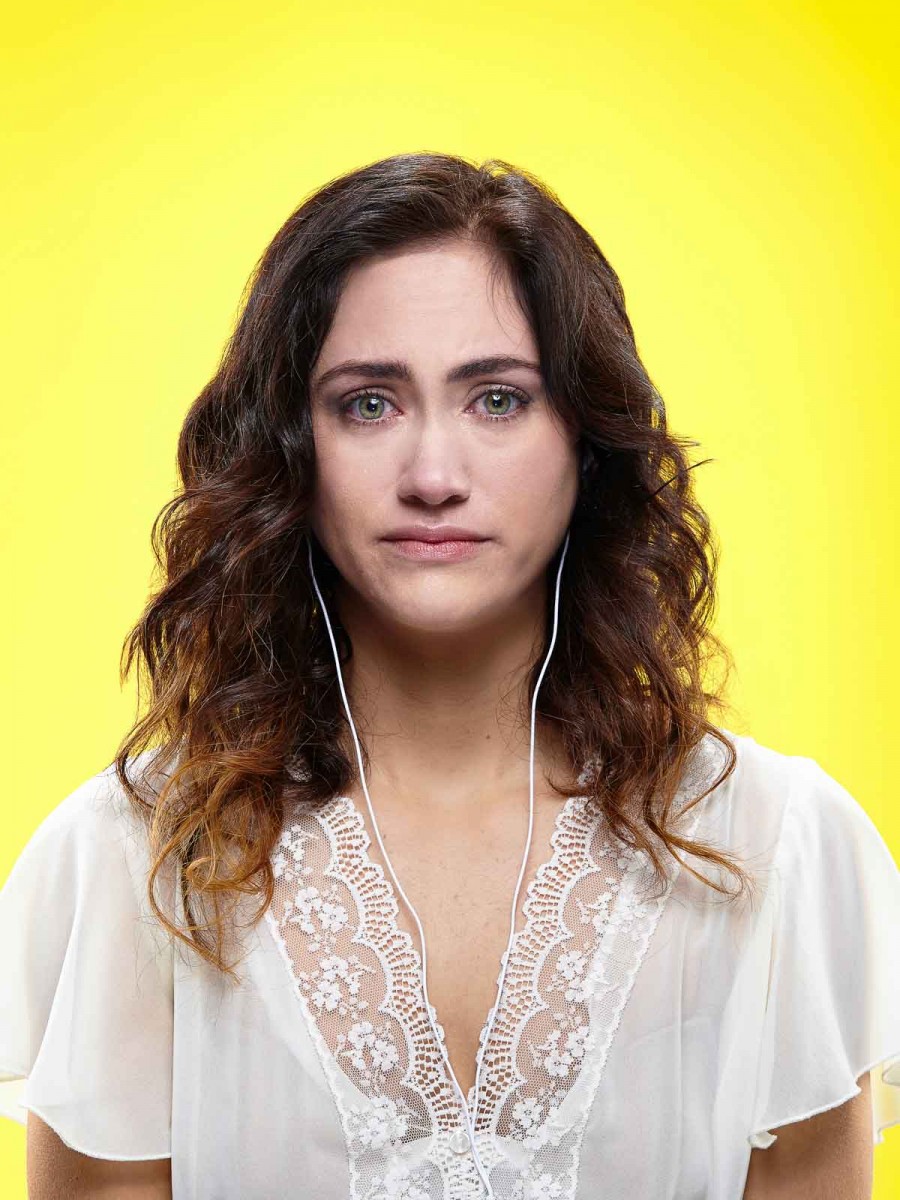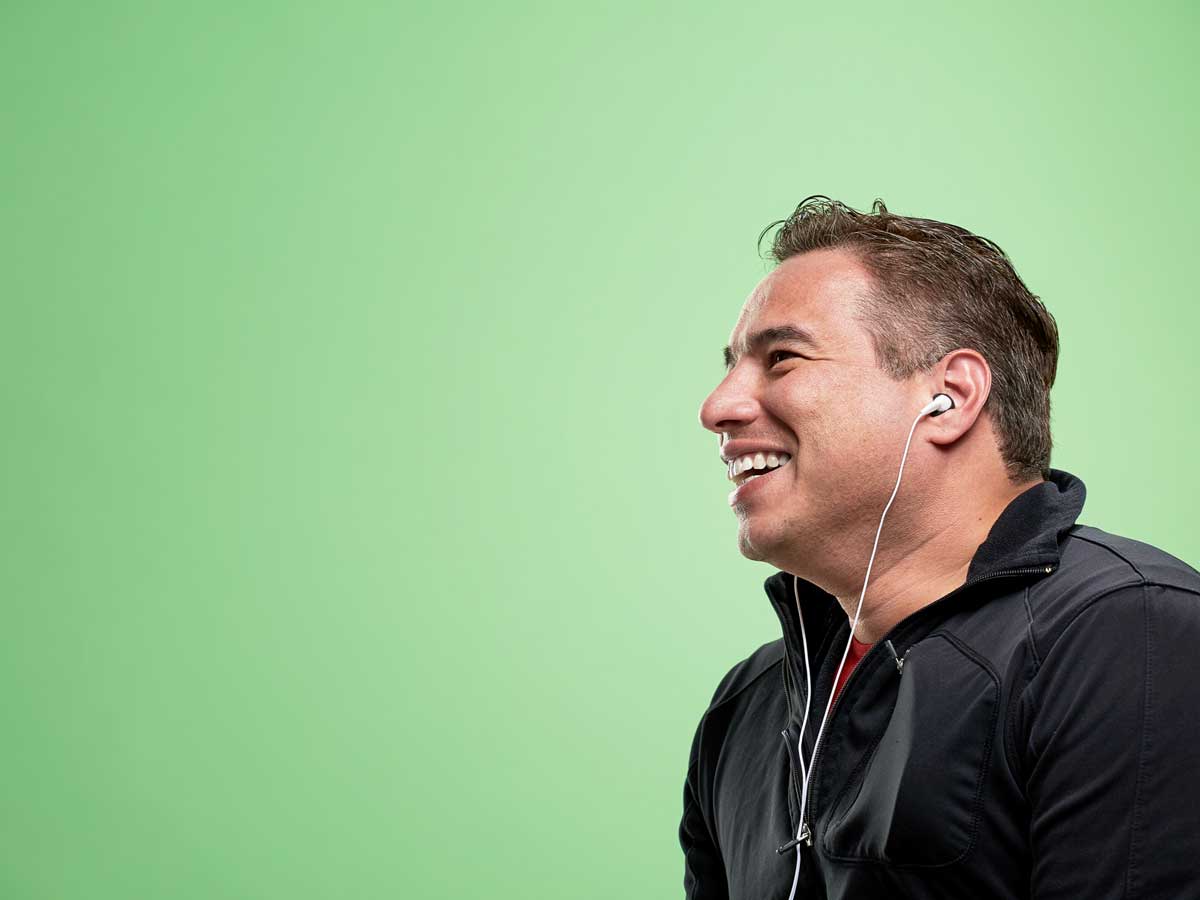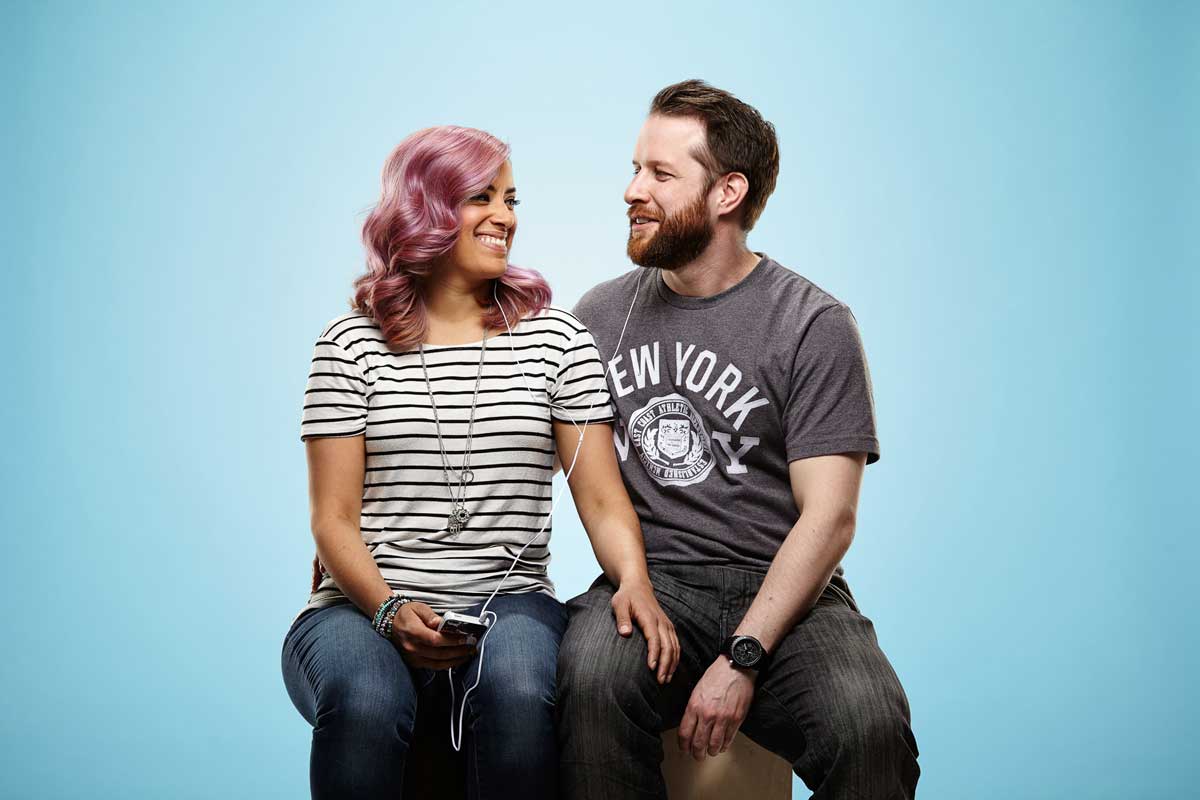by Jamie Ludwig
Kevin Penczak is an up-and-comer in Chicago’s commercial photography industry. Raised in Elk Grove Village, Penczak developed an early interest in photography through documenting his local skateboarding scene. Since then, he’s moved on to new and different topics but his work, which largely focuses around portraits and character studies, retains common threads of boldness, movement, and excitement that invoke each subjects’ distinct personality.
All of these themes come to a head in Penczak’s latest project, “The Moth,” which was inspired by the popular non-profit storytelling association of the same name. A fan of the group’s radio show and live reading events, Penczak invited Moth storytellers to participate in a unique portrait series. Seated in front of brightly-colored backdrops, the subjects listened to some of Penczak’s favorite stories through headphones while he shot photos of their response. The resulting images capture a wide range of human emotion, inner beauty, and effectively paint stories in their own right.
Penczak recently spoke with us regarding his emerging career and the creative process behind “The Moth” photo series.

© Kevin Penczak, The Moth Project, Titled: Venessa
Tell me a little about your personal story and what led you to photography. I got into photography through skateboarding. It went hand in hand with capturing tricks and the skateboarding lifestyle. I always loved photography but I never thought it could be a career. I didn't even know commercial photography was a thing you could do until my early 20s. After I worked a couple of random jobs I decided I was going to go for it professionally. I went to school about six years ago, and graduated 4-5 years ago. Then I started assisting and shooting. It's fast, but it feels slow at the same time.
Was your family supportive of your decision to leave your job to pursue photography? Yeah, definitely. My family and my girlfriend at the time—now my fiance—were very supportive. The job I was working didn't have a future, so they weren't too sad when decided to pursue something I liked.
After graduating, what steps did you take to establish your career? I am still at the early stages of my shooting career. Right out of school I went to do a photo job that I just hated. Then I started interning for a photographer here in Chicago named Taylor Castle. I assisted with him for a solid year, and I still assist for him on occasion. He's helped me with everything. When I wanted to shoot something he let me use his studio. He'd walk me through every little thing that you could come across in commercial photography. He's been the main reason I'm actually starting to shoot stuff now.
Would you recommend that every emerging photographer find a mentor? Yeah, I think so. I don't know how else you would do it. He helped me with everything and still does. A lot of stuff I do now is basic product stuff I do to pay the bills. I enjoy it, but it's not what I see in my future. I don't know how else you could learn the business without someone there. With Taylor, I got really lucky that I had one-on-one time with him. I know other people who have interned for photographers and ended up just around cleaning the floors and not having any interaction. With Taylor it was perfect because I got to hang out and learn everything I could and ask every question I could.
In that case, what do you think are some of the most important skills you've learned from Taylor or that you've picked up along the way in terms of running your own business or marketing yourself? I am still pretty new at this, but I've learned you have to be really good and have a style that is you. I don't do a ton of marketing right now. Hopefully I'll start doing some more advertising, even if it is simple email blasts and simple stuff like that. Most of the jobs I've done are word of mouth, just from other friends or photographers who know I could do the job.
How do you view the climate for emerging photographers in Chicago these days? What advantages come from being here vs. elsewhere and vice versa? I grew up in Chicago and I love it. I have no plans to go anywhere else. You need a big city for what most commercial photographers want to do. The community here is awesome. When I first started going to APA meetings it was kind of awkward because I didn't know anyone, but once you start to meet people the community is awesome. Everyone is great and fun and helpful, too. Once people know that you're a decent photographer they can trust you and pass you a job, even if it is something really small.
Tell me a little about your involvement in APA's Success Teams. This is my second year in the APA Success Team, which means it's probably my 16th month. We meet once a month and the whole idea is to produce personal work, get feedback, and help your business plan. We discuss everything from marketing to actual photography. It's great to see what other people are doing and get feedback. The people in my group are all good friends now. I've used their studios. If they need a favor I can help them out and they're more than willing to help me out. It’s really created a strong community among the 7 or 8 members we have.
So it's a professional meeting, but you're also working on personal projects. What amount of time do you spend doing personal versus professional projects? Which is a better way to market yourself? Most of the work on my website is personal work because no one is hiring me to do the type of work I want to do yet. I just do what I want to do, shoot what I want to shoot, and hope that it turns into getting paid for the type of work I want to shoot. I might shoot something for a job and not show it because it doesn't really fit my sensibilities as a photographer.
Let's talk about The Moth. How did you get involved? What sort of connections do you find in storytelling through a video medium like photography versus an audio medium like radio? How did you represent these people in a photo? That project started out because I enjoyed listening to The Moth Radio Hour in my car, and later going to the live show. The stories can be very emotional and inspiring. Some are fun and lighthearted. Some are really powerful. You always have a reaction, and I wanted to capture that. In radio you're actually hearing the story and being affected by that. The images convey the emotion, not to the extent the stories do, but I hope they make you want to hear the story the people are listening to and enjoy the story for yourself. These photos can show you a perspective you don't always have. I hope people can see them, then dive into the stories I love so much.

© Kevin Penczak, The Moth Project, Titled: Bryan
What was it like working with the storytellers? Some people are naturally comfortable in front of the camera, but it wouldn't be the same as working with professional photographer models that you might come across in your regular work. It was pretty basic. I had a bunch of stories. I had a person sit down and put headphones on. I'd have my headphones on and press play. The person wouldn't know what story was coming and they reacted to it naturally, and I would follow along and just capture that as we went.
Do you think that shared experience made it more open for them? I tried to put them in their own little world. I wanted them to feel like they were by themselves, though I am sitting there with a camera. It made me feel better about the process. If someone is sitting there for 15 minutes and I'm just sitting there with the camera it would feel very voyeuristic. When I'm listening to the story too it feels like we're going through it together. It made it a better process for me, and hopefully for them too.

© Kevin Penczak, The Moth Project, Titled: Geno
Did you arrange the shoots with The Moth producers? Are you working with them to cross promote at this point? After I shot the first round of images and I had them on my computer, I sent them over to The Moth through a name I found on their website. It went around the office, and they all really liked the project and they wanted to share it on social media. They just loved the idea. When I decided to do a second round of images. The Moth put the word around, "Kevin is in Chicago and looking to do more of these. Email him if you want to be a subject." I got 25 emails from people who were free on that Saturday. We had them come into the studio, listen to stories for twenty-minutes each. I'd take their photos and they'd be on their way.
It's amazing to think you did all of these in just a couple of sessions. It definitely should have been more, but it is kind of a production. I had to have an assistant, a studio, and someone to open the doors for people. I had light hair and makeup to make them look camera-ready so the light hit them right. We had four different backgrounds. Whatever the person was wearing we'd say, "Hey, that looks best with blue," and we'd throw blue down. It was a very quick process.
You captured the emotions of your subject and the stories they are listening to. Were the stories chosen at random, or did you get a sense of who these people were and what they might respond to that particular day? I chose the stories because they were my favorites and I thought since there were 25 people coming I wanted to have about 60 stories ready to go. In the weeks leading up to it I just listened to a ton of Moth Radio Hour, and I would save the stories I felt there would be emotional reactions to. In a 15 minute story there might be only one 30-second payoff as far as capturing emotion would go. As far as the stories for each person, I wanted it to be more random. I didn't want to pair up a theme with a certain person. I thought that might be stereotyping them. I picked stories I loved, and maybe I'd ask someone if they wanted to hear "happy" or "sad," but that's about it.

© Kevin Penczak, The Moth Project, Titled: Saritza
Will you do another round of images at some point? I think I will do more. The first one was five people. The second one was 25 people, which was definitely aggressive. The next time I do it, I will do 10-15 people. I think there are still different ways to shoot it. Get closer, get different people to participate—there are ways I can explore it more.
What sort of advice would you give to new photographers or those looking to transition into a new career field? I think I am the new photographer still. As far as the commercial realm goes, I'm still just starting to break into the field. It's tough because there are so many good photographers in Chicago, but I think think if you have your own style and shoot what you like there is always room for more people. You have to come from your unique perspective. Don't get too caught up in what other people are doing. It might be great for them, but you have to do what you're good at. Find your own way.
Last question: In a nutshell, how would you describe where you are and where you want to go. As far as photography in Chicago, I'm just getting started in the commercial, editorial, and advertising realm. I would like to push that way further and eventually shoot only what I want. Right now I'm shooting to pay the bills, but I'd love to shoot more people, portraits, and sports, do a lot more editorial and get into advertising. I love having different projects all the time. I love the freedom that comes with freelance photography where you are shooting different stuff all the time. It might be a day here, and a few days there, but it keeps you doing different stuff and a fresh mind.

